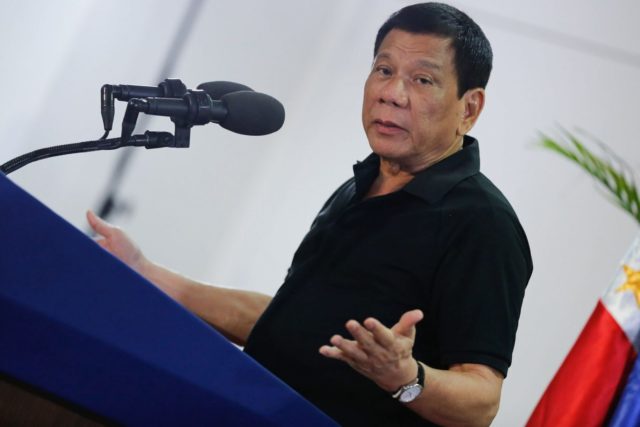
Philippines willing to open bases to US if Ukraine conflict spreads President Rodrigo Duterte delivers a message upon his arrival at the Francisco Bangoy International Airport in Davao City on September 30, 2016. (TOTO LOZANO/PPD/Released)
This article was originally published by Radio Free Asia and is reprinted with permission.
President Rodrigo Duterte is willing to allow American forces to use Philippine bases and facilities if the crisis in Ukraine stemming from the Russian invasion spreads to Asia, the Filipino ambassador to Washington said Thursday.
The Philippines would honor the decades-old Mutual Defense Treaty (MDT), which binds the two allies to aid each other in times if a foreign power attacks either country, and would allow the U.S. to use former American naval and air bases here, envoy Jose Manuel Romualdez said.
If the U.S. asks for support, Duterte “was very clear that – if push comes to shove – the Philippines will be ready to be part of the effort, especially if this Ukrainian crisis spills over to the Asian region,” Romualdez told reporters in Manila during an online forum.
“He offered that the Philippines will be ready to open its doors, especially to our ally the U.S. in using our facilities, any facilities they may need,” Romualdez said, speaking from Washington.
Officials at Malacañang, the presidential palace in Manila, did not respond immediately on Thursday to an inquiry from BenarNews for further comment on what Duterte told the Philippine ambassador.
Romualdez, who met recently with the president in Manila, said that Duterte indicated his approval to open former military bases in the event of an “emergency situation” and allow the U.S. forces to come back to the Subic Bay Naval Base and Clark Air Base if the Ukrainian conflict spills over in Asia.
The two bases were among United States military’s largest overseas installations but were shut down after the Philippine Congress voted to end their lease in the early 1990s, at the end of the Cold War. Since U.S. forces vacated both sites, they have been transformed into free ports and investment zones.
“I’m pretty sure that the president meant this to be in an emergency situation where – let’s pray it does not happen – but, if it spreads out in the Asian region for some reason or another, the President obviously sees that need for us to make a choice,” Romualdez said.
“And our choice is … since we have an MDT with the United States, we have this special relationship and military alliance, he [Duterte] said he is allowing the use of facilities,” the ambassador said.
Still, the U.S. has not wavered in the military alliance and has helped the Duterte administration defeat pro-Islamic State militants when they took over the southern city of Marawi for five months in 2017.
In February 2021, U.S. Defense Secretary Lloyd Austin III reaffirmed Washington’s commitment to the 1999 Visiting Forces Agreement (VFA) and the 1951 Mutual Defense Treaty during his first official phone call with his Philippine counterpart, Delfin Lorenzana.
The VFA, which came into force in 1999, provides legal cover for large-scale joint military exercises and allows U.S. troops to operate in the Philippines on a rotational basis. It has remained in effect since Manila deferred its termination.
The comments by Romualdez to reporters came less than a week after Duterte said that the Philippine should remain “neutral” over the Ukraine crisis because it was too far from Russia geographically.
The ambassador made the comments hours after remarks during a congressional hearing in Washington by Adam Smith, chairman of the House Armed Services Committee, who called on the United States to strengthen its defense ties in the Indo-Pacific region in light of the Ukrainian crisis and a potential similar one involving China and Taiwan.
Russia started attacking Ukraine on Feb. 24, drawing international condemnations and strict economic sanctions, led by the U.S., in a bid to stop President Vladimir Putin’s punishing military offensive.
On Mar. 2, the Philippines joined 140 other U.N. member-states to vote in favor of a General Assembly resolution that condemned Russia’s military strike on Ukraine.
Romualdez said that while Duterte “values the friendship he made with President Putin and President Xi [Jinping of China], he knows that this thing happening right now in Ukraine is something that should not have happened because it was unprovoked.”
“The president was very concerned about it, and his major concern was how it will affect our economy, which already is,” Romualdez said, adding it was the top priority in their discussion.




